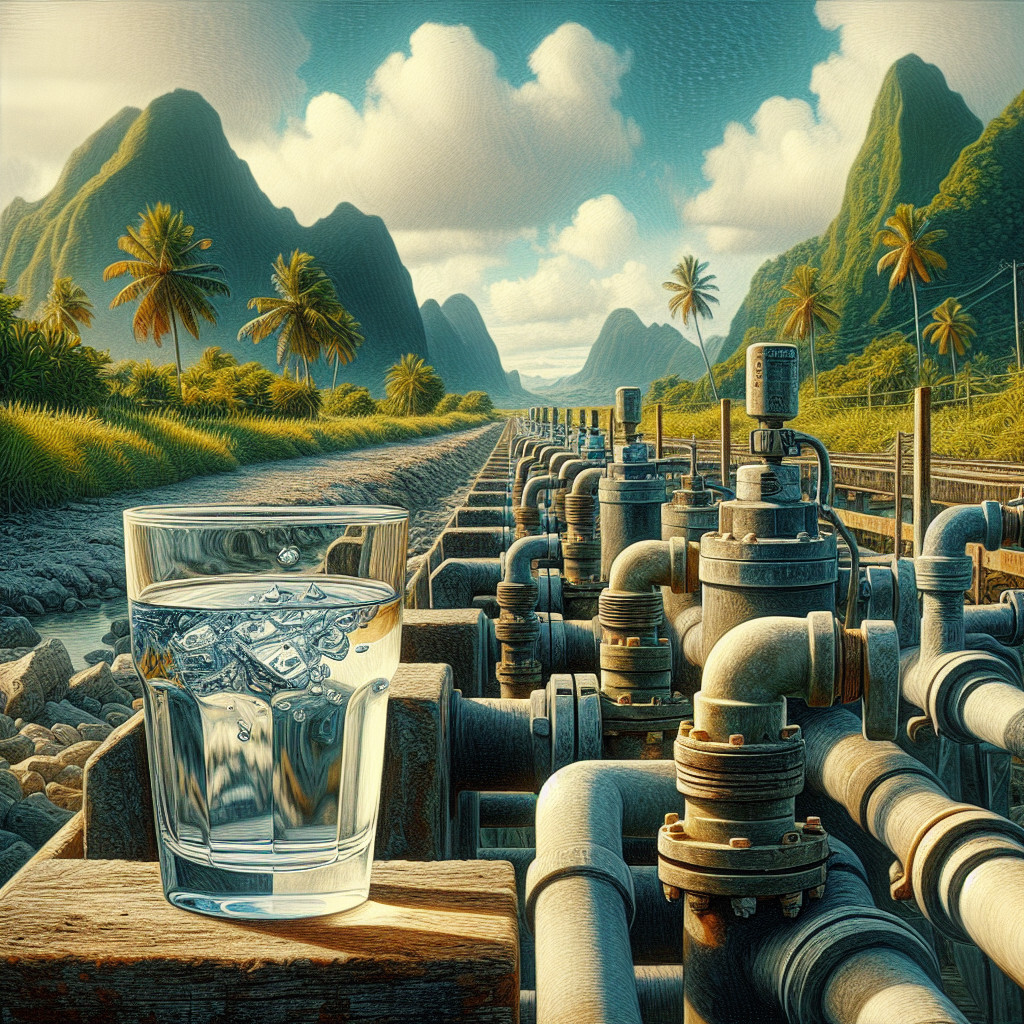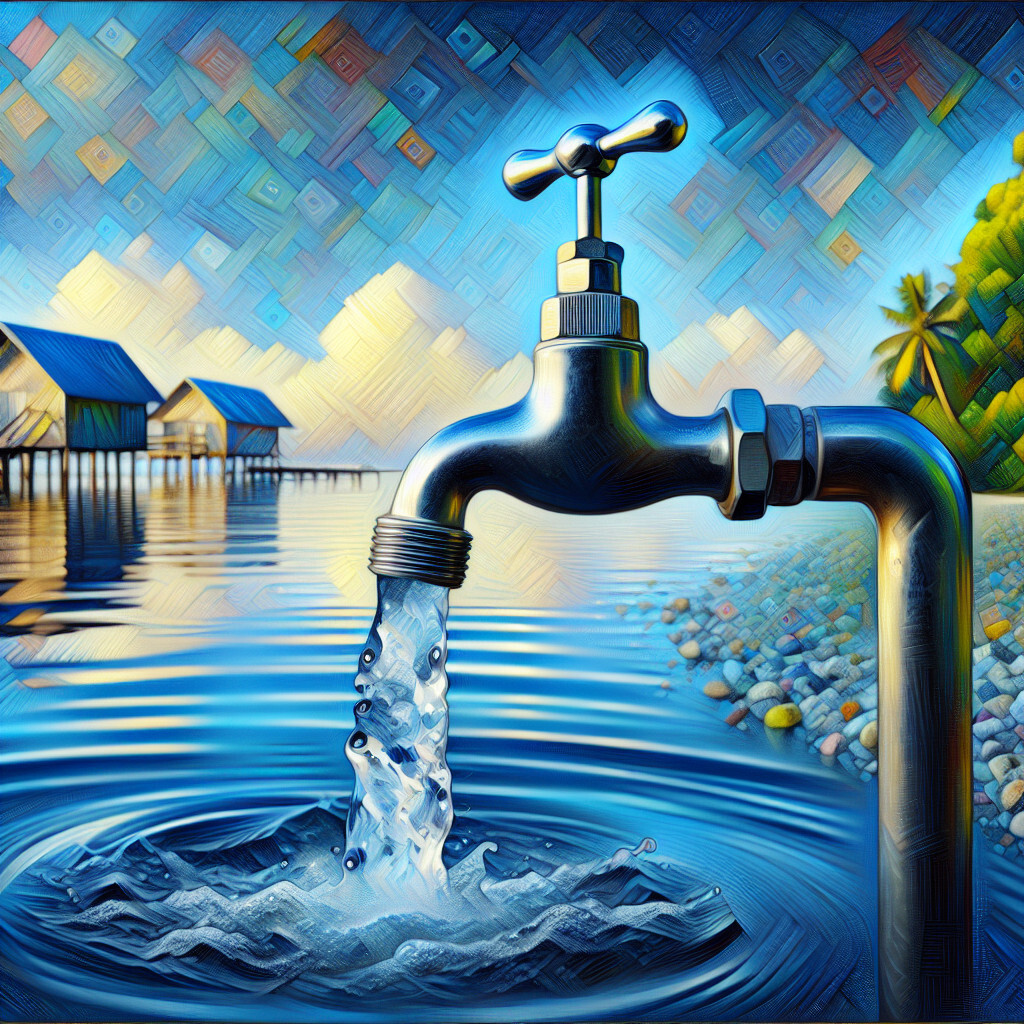-
Table of Contents
“Tuvalu’s Tap Water: A Challenge of Sustainability and Purity.”
Introduction

The tap water in Tuvalu, a small island nation in the Pacific Ocean, is a critical issue due to the country’s geographical location and climate conditions. The country heavily relies on rainwater collection as the primary source of fresh water, as it lacks rivers or lakes. The groundwater is not suitable for drinking due to high salinity levels. The tap water is often stored in tanks, and its quality can vary significantly, potentially leading to health issues. Therefore, it is generally recommended for visitors to drink bottled water.
Understanding the Quality of Tap Water in Tuvalu
Tuvalu, a small island nation located in the Pacific Ocean, is known for its picturesque landscapes and rich cultural heritage. However, one aspect that often goes unnoticed is the quality of its tap water. Understanding the quality of tap water in Tuvalu is crucial, as it directly impacts the health and well-being of its residents and visitors.
Tuvalu’s tap water quality is a matter of concern due to several factors. The primary reason is the country’s geographical location and climate. Tuvalu is a low-lying country, with the highest point being only 4.6 meters above sea level. This makes it highly susceptible to sea-level rise and saltwater intrusion, which can contaminate freshwater sources. Moreover, Tuvalu’s tropical climate, characterized by heavy rainfall and high temperatures, can lead to the proliferation of waterborne diseases.
The country’s water supply primarily comes from rainwater harvesting, which is stored in tanks for household use. While this method is sustainable and cost-effective, it poses significant health risks if the water is not treated properly. Rainwater can contain various contaminants, including bacteria, viruses, and chemicals, which can cause illnesses such as diarrhea, typhoid, and cholera. Therefore, it is recommended to boil or filter the tap water before consumption.
Furthermore, the infrastructure for water supply and sanitation in Tuvalu is relatively underdeveloped. Many households lack access to piped water, and those that do often face intermittent supply. The water pipes are also prone to leaks and breakages, which can lead to further contamination of the water. The government has been making efforts to improve the water infrastructure, but progress has been slow due to financial constraints and logistical challenges.
Despite these challenges, it’s important to note that the quality of tap water in Tuvalu varies across different parts of the country. In the capital city of Funafuti, for instance, the tap water is generally safe to drink, thanks to a modern water treatment plant that ensures the water meets international standards. However, in the outer islands, where access to clean water is more limited, residents often rely on untreated rainwater or shallow wells, which can be contaminated with harmful substances.
In conclusion, the quality of tap water in Tuvalu is a complex issue that is influenced by a variety of factors, including the country’s geographical location, climate, water supply methods, and infrastructure. While the tap water in some areas is safe to drink, in others it may pose health risks if not treated properly. Therefore, it is advisable for residents and visitors to take necessary precautions, such as boiling or filtering the water, to ensure its safety. At the same time, there is a pressing need for continued efforts to improve the water infrastructure and sanitation facilities in Tuvalu, to ensure access to clean and safe water for all.
The Impact of Climate Change on Tuvalu’s Tap Water
Tuvalu, a small island nation located in the Pacific Ocean, is grappling with a significant challenge that threatens its very existence – climate change. This global phenomenon has far-reaching implications for the island’s natural resources, particularly its tap water. The impact of climate change on Tuvalu’s tap water is a matter of grave concern, as it directly affects the health and livelihood of the island’s inhabitants.
Tuvalu’s tap water primarily comes from two sources: rainwater and groundwater. Rainwater is collected in tanks, while groundwater is extracted from shallow wells. However, climate change has disrupted this delicate balance. Rising sea levels, a direct consequence of global warming, have led to the intrusion of saltwater into the freshwater lens, contaminating the groundwater. This phenomenon, known as saltwater intrusion, has rendered the groundwater unfit for consumption or irrigation.
Moreover, climate change has also led to erratic rainfall patterns. Tuvalu has been experiencing prolonged periods of drought, followed by intense rainfall. This irregularity in rainfall has made it difficult to rely on rainwater as a consistent source of tap water. During droughts, the rainwater tanks run dry, forcing the island’s inhabitants to rely on the already compromised groundwater. On the other hand, intense rainfall often overflows the tanks, leading to wastage of precious water.
The quality of Tuvalu’s tap water has also been affected by climate change. The increased temperature has led to the proliferation of harmful bacteria and algae in the water, posing a serious health risk. Furthermore, the saltwater intrusion has increased the salinity of the tap water, making it unsuitable for consumption. High salinity can lead to various health problems, including high blood pressure and kidney diseases.
The impact of climate change on Tuvalu’s tap water has also had socio-economic implications. Agriculture, a significant source of livelihood for the island’s inhabitants, has been severely affected. The increased salinity of the water has made it unsuitable for irrigation, leading to a decline in crop yield. This has not only affected the income of the farmers but also led to food scarcity on the island.
The government of Tuvalu, along with international organizations, has been making efforts to mitigate the impact of climate change on the island’s tap water. Desalination plants have been set up to remove the excess salt from the water. However, these plants are expensive to operate and maintain, putting a strain on the island’s limited resources. Rainwater harvesting techniques are being promoted to make the most of the rainfall. Additionally, efforts are being made to improve the storage and treatment of tap water to ensure its safety and quality.
In conclusion, climate change has had a profound impact on Tuvalu’s tap water, affecting its availability, quality, and use. It has highlighted the vulnerability of small island nations like Tuvalu to global phenomena. While efforts are being made to mitigate the impact, it is clear that a global response to climate change is needed. The plight of Tuvalu serves as a stark reminder of the urgent need to address climate change, not only for the sake of the island’s inhabitants but for the survival of our planet.
Challenges and Solutions in Tuvalu’s Tap Water System
Tuvalu, a small island nation located in the Pacific Ocean, is known for its picturesque landscapes and rich cultural heritage. However, beneath this idyllic facade, the country grapples with a significant challenge: ensuring the provision of safe and clean tap water for its residents. This article aims to shed light on the challenges and solutions in Tuvalu’s tap water system.
The primary challenge in Tuvalu’s tap water system is the scarcity of freshwater resources. Tuvalu, being a low-lying atoll nation, lacks rivers or lakes, which are conventional sources of freshwater. The country primarily relies on rainwater harvesting and desalination for its freshwater needs. However, these sources are not without their problems. Rainwater, for instance, is highly dependent on the weather, and during periods of drought, the supply can be severely affected. On the other hand, desalination, which involves removing salt and other impurities from seawater, is an expensive process and requires a significant amount of energy.
Moreover, the quality of tap water in Tuvalu is another pressing issue. The country’s groundwater, which is a secondary source of water, is often contaminated with saltwater intrusion due to its proximity to the sea. This, coupled with inadequate sanitation facilities and waste management systems, often leads to the contamination of water sources, making the tap water unsafe for consumption.
Climate change exacerbates these challenges. Rising sea levels, a consequence of global warming, threaten to inundate the low-lying islands of Tuvalu. This not only poses a risk to the country’s land and infrastructure but also its freshwater resources. Saltwater intrusion into the groundwater is expected to worsen with rising sea levels, further compromising the quality of tap water.
Despite these challenges, efforts are underway to improve Tuvalu’s tap water system. The government, in collaboration with international organizations, has initiated several projects aimed at enhancing the country’s water security. One such initiative is the installation of large-scale rainwater harvesting systems. These systems, equipped with filtration units, aim to provide a reliable and safe source of drinking water.
In addition, steps are being taken to improve the country’s desalination capacity. With the aid of international funding, Tuvalu has been able to procure energy-efficient desalination units. These units not only reduce the cost of desalination but also lessen the environmental impact of the process.
Furthermore, efforts are being made to protect and restore the country’s groundwater resources. This includes the construction of seawalls to prevent saltwater intrusion and the implementation of better waste management practices to prevent contamination.
In conclusion, while the tap water system in Tuvalu faces significant challenges, solutions are being implemented to address these issues. Through a combination of technological innovation, international cooperation, and local initiatives, Tuvalu is striving to ensure that its residents have access to safe and clean tap water. However, the success of these efforts will largely depend on the global response to climate change, which remains the overarching threat to Tuvalu’s water security.
The Role of Desalination in Providing Tap Water in Tuvalu
Tuvalu, a small island nation located in the Pacific Ocean, is renowned for its picturesque beauty and rich cultural heritage. However, beneath this idyllic facade lies a pressing concern that has been plaguing the island for years – the scarcity of fresh water. The tap water in Tuvalu, unlike in many other parts of the world, is not sourced from rivers, lakes, or underground aquifers. Instead, it is primarily obtained through a process known as desalination.
Desalination is a technological solution that involves the removal of salts and other minerals from seawater, thereby making it suitable for human consumption and use. This process is particularly crucial for Tuvalu, given its geographical location and lack of natural freshwater resources. The island’s small size, coupled with its low-lying topography, makes it highly susceptible to the impacts of climate change, including rising sea levels and increased salinity of groundwater. Consequently, the traditional sources of freshwater, such as rainwater harvesting and groundwater extraction, are no longer reliable or sufficient to meet the island’s water needs.
The role of desalination in providing tap water in Tuvalu has been steadily increasing over the years. The government, with the assistance of international organizations, has invested heavily in desalination plants to ensure a steady supply of potable water for its residents. These plants use advanced reverse osmosis technology to filter out the salts and other impurities from the seawater, producing freshwater that is safe for drinking and other domestic uses.
However, while desalination has been instrumental in addressing Tuvalu’s water crisis, it is not without its challenges. The process is energy-intensive and requires a significant amount of electricity, which is primarily generated from imported diesel fuel. This not only increases the cost of water production but also contributes to greenhouse gas emissions. Furthermore, the disposal of the concentrated brine, a byproduct of desalination, poses environmental concerns due to its high salt content and potential to harm marine life.
Despite these challenges, efforts are underway to make desalination more sustainable and cost-effective in Tuvalu. The introduction of solar-powered desalination units is a promising development in this regard. These units harness the abundant sunlight in the island to power the desalination process, thereby reducing the reliance on fossil fuels and lowering the carbon footprint. Moreover, research is being conducted to explore environmentally friendly methods of brine disposal, such as its use in aquaculture or its conversion into useful products.
In conclusion, desalination plays a pivotal role in providing tap water in Tuvalu. It is a lifeline for the island nation, ensuring the availability of freshwater in the face of climate change and geographical constraints. However, the sustainability of this solution hinges on addressing the associated environmental and economic challenges. With continued research and innovation, it is hoped that desalination can continue to quench the thirst of Tuvalu’s residents without compromising the island’s ecological balance.
Q&A
1. Question: Is the tap water in Tuvalu safe to drink?
Answer: No, the tap water in Tuvalu is not considered safe to drink due to contamination and lack of proper sanitation.
2. Question: What are the main issues with the tap water in Tuvalu?
Answer: The main issues with the tap water in Tuvalu include contamination from bacteria, viruses, and parasites, as well as saltwater intrusion due to rising sea levels.
3. Question: How do residents of Tuvalu get their drinking water?
Answer: Residents of Tuvalu primarily rely on rainwater collection for their drinking water needs, as the tap water is not safe to drink.
4. Question: Are there any efforts to improve the tap water quality in Tuvalu?
Answer: Yes, there are ongoing efforts by the government and international organizations to improve water sanitation and infrastructure in Tuvalu.
Conclusion
The tap water in Tuvalu is not safe for drinking due to contamination and lack of proper sanitation. It is recommended to drink bottled or boiled water.






